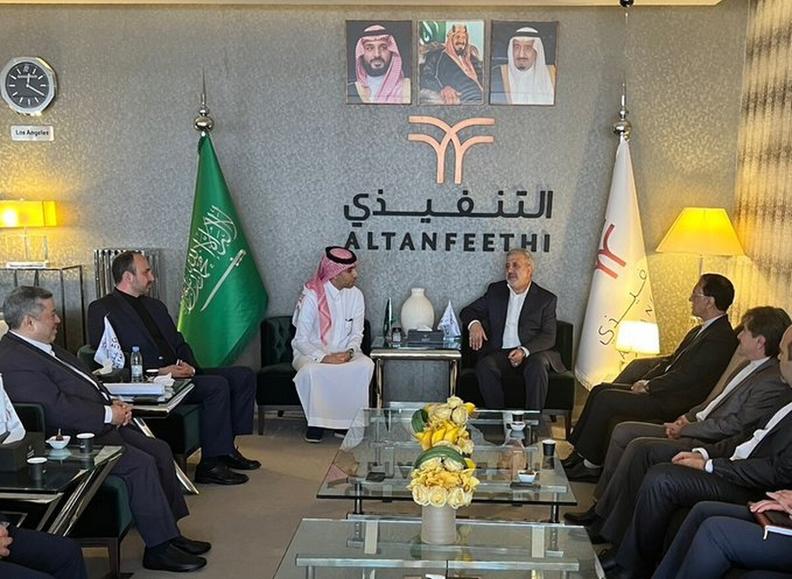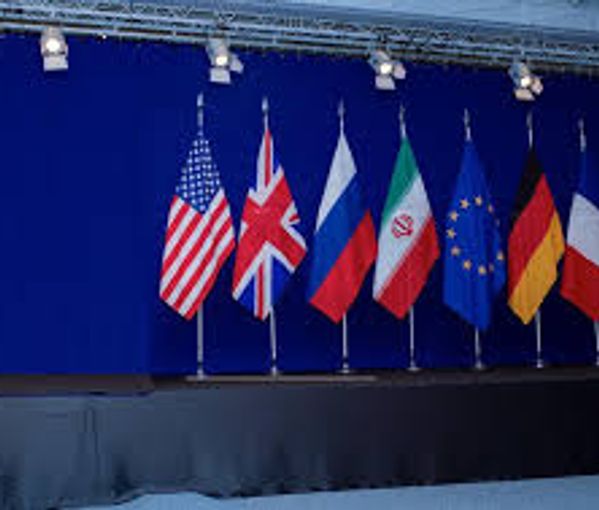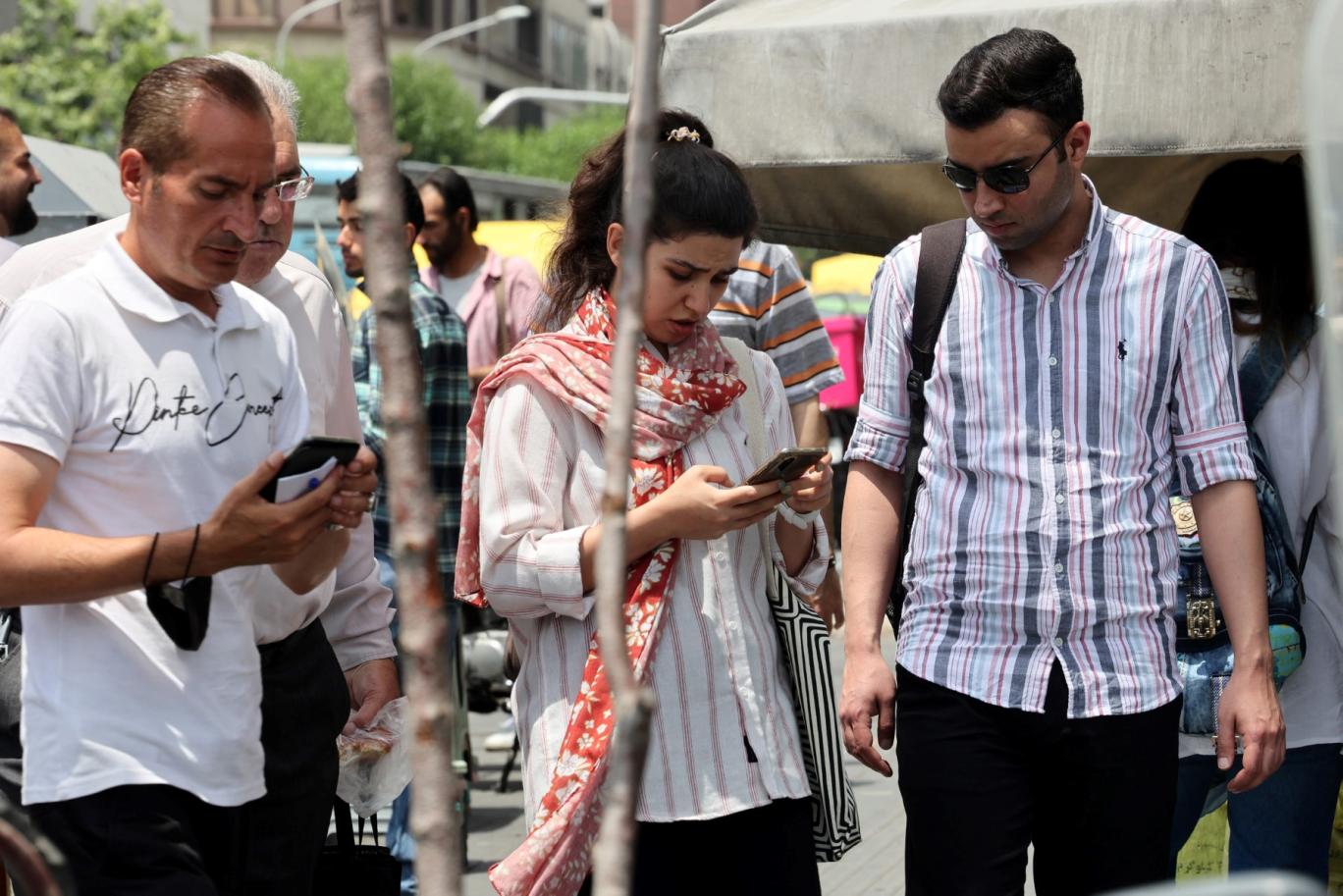
Governmental Statistics in the Government Week
The editorial of Arman Melli penned by “reformist” academic Sadegh Zibakalam argues that the Iranian government’s solution to all problems is issuing executive orders without following up on the issues, while officials continue to vastly overstate the government’s achievements in all fields.
That governments promote their work while ignoring their failures and shortcomings and claiming victories and achievements for themselves is not just confined to Ebrahim Raisi’s government. That governments consider themselves successful while calling previous ones failures is not just confined to Raisi’s government either.
But it seems that Raisi’s government is breaking all records in self-promotion and considering itself as successful. Basically, the government’s approach to problems is issuing executive orders. So when there is a shortage of goods, President Raisi says he has issued an order for fixing it. If this or that bad incident happens, Raisi says he has issued an order for dealing with it immediately.
In other words, whenever there is an issue or a problem, we see that the government’s solution is just issuing an order. What we do not see from Raisi’s government is an explanation about problems and issues.
Or to put it more aptly, the government acts as if there is no problem: inflation is declining, unemployment is decreasing and more houses are under construction. So, the government claims, there is basically no problem at all. If, incidentally, there is a problem, the government will issue an order and it will be resolved.
But the problem is that Raisi does not ever follow up on the issue later to see if it is resolved or not. He does not follow up, for example, on the issue of the shortage of goods. Has the issue been dealt with? Has the problem been resolved? These are simple questions not usually answered by Raisi’s government.
What is for sure is that people’s views, feelings and judgements in this regard are different from Raisi’s government. If only people could feel that just a part of what Raisi’s government claims is true!
Holding Debates for Transparency
The editorial of Arman Melli urges that government officials must accept the invitation of former government officials for holding debates so that people can judge for themselves what the truth is.
A country which is seeking to achieve its goals and plans must know the realities well. Basically, planning is nothing but studying the status quo for reaching the desired utopia. So, if Iranian officials want to achieve their utopian ideals, it is essential to know facts and realities.
To understand the current situation, we need to have correct information. For example, economic officials say that they have been able to cut the inflation rate from 60% to 45%. Now the question is: in which report of the Central Bank or Budget and Planning Organization has this 60% inflation rate been cited? There is no mention of this number on the websites of the Central Bank, Statistical Center of Iran, Budget and Planning Organization, or any other official reports in the country.
If there is such a statistic, where can it be found? So, it seems that such statistics are claimed for political purposes. Senior officials of the country must provide statistics based on official sources like the Statistical Center of Iran. Such statistics must be clearly cited and there is nothing confidential about it.
The problem is that society’s realities are not depicted accurately. More transparency, particularly in the economic field, benefits national interests and developmental goals. On the other hand, the lack of transparency benefits brokers, dealers, rent seekers and perpetuates corruption.
Therefore, statistics and information must be transparent to make it possible for businesses to properly thrive. Transparency means the free flow of information between different economic sectors which can prevent rent seeking, while increasing investments in the economy, growth in national production and the promotion of economic welfare in the society.
If Ebrahim Raisi’s government claims that the previous government caused many economic problems for the country, the current officials must hold debates with the former ones in this regard. Previous governments’ performances can be certainly criticized, but if there are any experts in the current government, they must welcome the suggestion for holding debates by the representative of the former government so that people can judge who is telling the truth.
Such debates will benefit the country’s national development and will also allow for a more rigorous analysis of the current economic realities.
Take Action If You Dare!
The editorial of Etemad written by renowned “reformist” Ahmad Zeidabadi slams Iranian hardline “principlists” for putting the Green Movement’s leaders, Mir-Hossein Mousavi and Mehdi Karroubi, under house arrest for 13 years without ever giving them a fair trial.
Recently, Javan daily, affiliated with the IRGC, expressed frustration that Karroubi and Mousavi, who are still under house arrest, have not been prosecuted like Donald Trump.
In this regard, it must be said that these two presidential candidates have been illegally under house arrest for 13 years for protesting the process and outcome of the 2009 presidential election, and have been deprived of their freedom.
Incidentally, those who acted like Trump in the 2009 presidential election were those who controlled the process of the election back then and did not tolerate any peaceful protests.
Trump encouraged his supporters to attack the US Congress and they took control of the US legislative branch for several hours. In Iran, can anyone even think of capturing the Parliament? Even if someone thinks of doing so, they will be branded as “fighters against God” and “corrupt on earth” and will be immediately shot to death.
The US judiciary system is impartial in dealing with the US administration and citizens and most lawyers in the United States acknowledge this impartiality. Each and every verdict of the judges in the United States can be criticized and denounced in the media. But how about Iran?
The judges of the revolutionary courts in Iran call themselves proudly the servants of the ruling establishment and explicitly brag that it is their duty to punish protesters to make an example of them for others. Any criticism against these judges will be considered as “mutiny against the law.” Now, Trump keeps calling the US judicial system corrupt and no charges are raised against him for that.
Karroubi and Mousavi have repeatedly insisted on their willingness to be put on trial within this judicial system in Iran only on one simple condition: they should be allowed to defend themselves in front of the public.
After 13 years of house arrest and physical and mental suffering, there is still time for putting them on trial.
It should not be forgotten that despite all the charges, Trump is the strongest candidate for the upcoming presidential election. Even if he goes to jail, he will still be allowed to run for president. Now, can the Iranian government accept the same thing for Karroubi and Mousavi?
Raisi’s Excessive Praise for His Government
The editorial of Jahan Sanat levels criticism against Ebrahim Raisi for praising his own government excessively.
It has been more than two years since Raisi came to power, but because of his mentality which was shaped during his tenure in the judiciary, he has not been able to learn the language and terms of the economy. Moreover, Raisi thinks that through exaggerated praise for his government’s performance during the past two years and claiming that his government has overachieved in all fields, he can convince Iranian citizens that his government has been the best ever since the Iranian revolution.
Raisi’s behavior in this regard is similar to that of Mahmoud Ahmadinejad who was Iran’s president from 2005 to 2013. Raisi, who demands fairness from his critics, slams former President Hassan Rouhani’s government very unfairly, acting as if he and the Parliament speaker were not a part of the decision-making process in the economy back then.
He talks about making friends with neighboring countries as he has played the primary role in this regard and does not recall that the political group affiliated with him attacked and set fire to the Saudi embassy in Tehran. Raisi talks about resolving Iran’s main problems as if there is no problem left to be dealt with.
Raisi thinks that his government has performed an economic miracle by bringing down the inflation rate from 60% to 45%. Such self-confidence and excessive praise for the government can seriously damage the country and its citizens, destroying what is left of their trust in the government.
The Iranian people can see with their own eyes. Moreover, the head of the Budget and Planning Organization recently said that the subsidies given by the government did not help people because of the high inflation rate, particularly the rise in prices of food items.
It seems that the media affiliated with Raisi’s government not only play a significant role in painting a distorted picture about the economy, they also encourage the government to ask independent media outlets to praise the government.

Iran’s Ambassador to Saudi Arabia Arrives in Riyadh

Iranian Ambassador to Saudi Arabia Alireza Enayati entered Riyadh and started his work on Tuesday.
Before leaving for Riyadh, Iran’s new ambassador to Saudi Arabia met with Iranian Foreign Minister Hossein Amir-Abdollahian and briefed him on the programs ahead in Iran-Saudi Arabia relations.
In this meeting, Abdollahian emphasized the development and deepening of neighborly policies and consolidating Iran’s relations with Saudi Arabia, given the opportunities created in the bilateral and multilateral fields.
Enayati was previously appointed as Iran’s ambassador in Kuwait and deputy minister.
Iran’s relations with Saudi Arabia resumed earlier this year following the meeting of both countries’ officials in Beijing, China.
After the resumption of Tehran-Riyadh relations, Saudi Foreign Minister Prince Faisal bin Farhan visited Iran and met with Iranian officials.
Later, Iran’s foreign minister, heading a high-level delegation, visited Saudi Arabia and met and with Saudi officials.
Hundreds of Political, Civil Activists Call for Referendum in Iran;“There Is No Other Way But Change,” Says Former Parliament Speaker

More than 300 political and cultural activists have warned against the perils of “religious tyranny” in Iran, calling for a referendum to change the country’s political structure.
The signatories, mostly Iran-based, stress in their statement, “The social, political and economic crises caused by the regime’s mismanagement in recent decades have faced Iran with extensive, bitter consequences.”
The statement also condemns the Iranian republic’s suppression of the slightest criticism and silencing each and every civil protest through imprisoning peaceful protestors and accuses the government of “closing its eyes and ears to reality either out of expediency or because of ignorance or self-interest.”
Ali Khamenei, however, had previously expressed his objection to any kind of referendum in Iran several months ago, saying “the country’s different issues cannot be put into referendum.”
In the same vein, former Parliament Speaker Mehdi Karroubi sent a message to his “reformist” Etemad Melli party, saying, “there is no other way but change; it is still possible to peacefully make major changes in the country.”
Karroubi, berating the Iranian establishment, noted, “A group of several individuals have the entire country in their hands, managing it without any plan.”
Being under house arrest for the last 13 years, Karroubi emphasized that one should endorse multiplicity and variety in the movement for change in Iran, including the younger generation, women, intellectuals, liberal and moderate trends inside the country, “One should talk to people while criticizing the government, Parliament and the country’s sovereignty.”
This former statesman condemned passing laws against people’s rights such as anti-JCPOA drafts, restricting cyberspace, intensifying punishment for those deemed improperly veiled or veilless and most importantly, the election law regarding the extensive disqualification of candidates.
“Gaining trust is possible through change; a change within Iran by people and without any kind of violence,” emphasized Karroubi.
Iranian Foreign Minister: “September Document” for Reviving JCPOA Is Ready

Iranian Foreign Minister Hossein Amir-Abdollahian stated that the popular uprising in Iran and the war in Ukraine might have caused a delay in the revival of the nuclear deal (JCPOA), revealing that last year a document known as the “September Document” was prepared between Iran and the other sides for restoring the JCPOA.
In his interview with Etelaat daily, Abdollahian stated that Oman’s sultan also suggested an initiative which is being indirectly negotiated with the United States.
Pointing to the eruption of protests last year following the death of Mahsa Amini in Iranian morality police custody, he explained that “we were really a few steps away from [reaching] an agreement” and perhaps if there were no protests, “we would have taken the final steps.”
While considering the nationwide protests and the war in Ukraine as the main cause of the delay in reaching an agreement between Iran and the West, Abdollahian claimed that “the other side was after taking advantage of those opportunities to impose certain conditions on us, but we really didn’t cross any red line.”
The “September Document” seems to refer to the draft agreement proposed by EU officials which was indirectly negotiated between Iran and the United States last summer.
Both countries had held negotiations indirectly to revive the nuclear deal under the mediation of the EU, along with China and Russia. Eventually, Josep Borrell, the EU Representative for Foreign Affairs, offered a document to both Iran and the United States which became a draft for both sides.
Iran’s negotiations with the P4+1 (the UK, Germany, France, China and Russia) started in 2021. In the final weeks of Hassan Rouhani’s presidency, it was announced that both sides were inches away from reaching an agreement. But Iranian Supreme Leader Ali Khamenei, in his final meeting with Rouhani’s government, unprecedently denounced the draft agreement calling it unacceptable.
After the popular uprising in Iran last year, US officials said reviving the JCPOA was no longer a priority for the Biden administration.
Tehran; Most Depressed Province in Iran

Ali Nazeri, scientific secretary to the 39th Psychiatry Convention in Iran, cited depression as the most common mental disorder, saying that in Iran twice as many women suffer from depression as men.
This psychiatrist pointed to the increase in the number depression cases in past decades in Iran, adding that a comparative study of a number of depression cases in the country’s provinces reveals that Tehran is on top, while Gilan and Yazd provinces are in better condition compared to others.
Nazeri underscored that currently depression is one of the most urgent problems in advanced and developing societies, adding that according to the latest global statistics, in every 100,000 men, there are more than 3,500 cases of depression, while in women, this number reaches 5,000; “in our country, this number is higher and the number of women suffering from depression is twice as many as men.”
Earlier in 2021, it was announced that only in Tehran nearly 34% of people suffer from obvious depression. Back then, it was reported that depression was exponentially increasing in Iran by 12.5% annually, while unofficial statistics are now indicating that 50% of the Iranian population suffer from depression.
Considering depression is the most common mental disorder, Nazeri said that people who suffer from this disease are constantly sad and lose interest in the things they once enjoyed.
Symptoms of depression include memory and focus difficulties, anxiety, low anger threshold, aggressiveness, constant exhaustion, guilty conscience and negative and even suicidal thoughts which may have irreparable consequences for individuals and society. The widespread prevalence of this disease in the country can significantly harm society.
Iran’s Oil Exports Soar to 2 Million Barrels per Day

Statistics released by an international tanker tracker company show that Iran’s oil exports in August reached almost 2 million barrels per day (bpd), the highest since 2018.
According to Tanker Trackers Company, Iran exported 1,770,000 bpd and 150,000 barrels of gas condensate in August.
Another tanker tracker company, that wanted to remain anonymous, has estimated Iran’s oil exports in August to have reached 1.5 millions bpd.
According to Bloomberg news agency quoting tanker trackers sources, Iran’s oil exports in August amounted to 1.85 million bpd.
In June, this number was roughly 1.5 million bpd.
The reason for the rise in Iran’s oil exports is reportedly its success in sidestepping US sanctions while the United States is closing its eyes to this issue in order to improve its relations with Iran.
Furthermore, Iran’s massive discount to China, the main buyer of Iran’s oil, is cited as another reason. China buys more oil shipments from Iran not just to provide for its refineries, but also to increase its oil reserves.
Before US sanctions, Iran exported 2.5 million bpd of oil and gas condensate.
Oil industry sources had earlier reported on Iran giving a $10 discount per barrel to Chinese refineries.
Because of this massive discount, Iran’s oil revenues have not increased, notwithstanding the significant growth in oil exports.
Recently, the Head of the Budget and Planning Organization Davood Manzoor stated that in the past five months, only half of the oil revenue, as predicted in the public budget, has materialized. He added that this year, the price of selling the country’s oil has been mostly at about $60 to $65 which is why only about 50% of oil revenues have been realized.
In the past five months, the average price of brent oil was about $80.
Iran also exports 100,000 bpd to Venezuela and Syria. In lieu of giving gas condensate to Venezuela, Iran receives heavy crude oil from this country. It is not clear if Iran receives any money from Syria for its exported oil.
